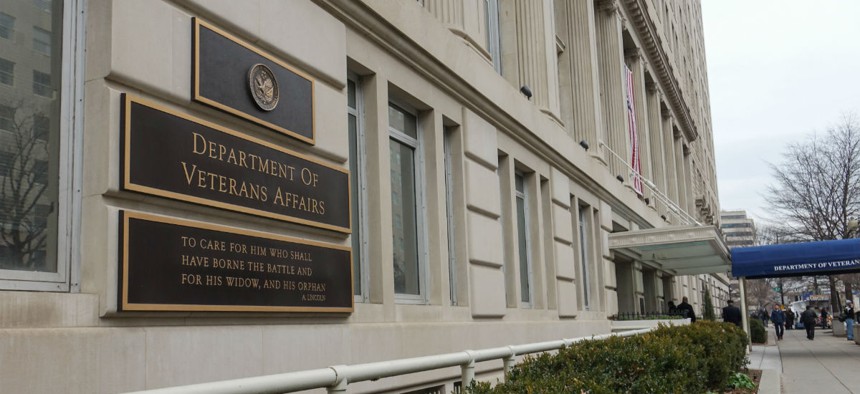
The Veterans Affairs Department headquarters in Washington. bakdc/Shutterstock
Trump VA Nominee Will Push For More Flexibility to Hire and Fire
Dr. David Shulkin said he would work with Congress on greater workforce accountability measures, but also on recruitment and retention efforts.
If confirmed as Veterans Affairs secretary, Dr. David Shulkin said he plans to pursue “far greater accountability” for the department’s workforce at the same time he will seek help from Congress to recruit and retain high performers.
Shulkin said “a basic function of any chief executive” is to have the right mix of people working in the organization, and “those that do stray from the values that we hold” have to leave. “For those employees that really don’t belong in the organization, the secretary needs the ability to remove them,” he said during his Wednesday Senate confirmation hearing. The current VA undersecretary for health said the department currently doesn’t have the ability to hire or fire properly, noting that the Justice Department last summer decided not to defend the expedited firing authority for VA senior executives included in the 2014 Veterans Access, Choice and Accountability Act because of constitutional concerns.
“So, we are going to need new tools, and I am going to need to come back to you, and we need to figure out a way to make what you want to happen work better and make it constitutional,” Shulkin told lawmakers on the Senate Veterans’ Affairs Committee. “On the other side, a secretary also needs the ability to retain, reward, and recruit those types of employees that we all want serving veterans,” Shulkin added. “And we have been hampered in our ability to use the tools we once had to be able to retain and recruit the very, very best.” The VA currently has 45,000 vacancies across the department, most of them within the Veterans Health Administration. Of those openings, roughly 37,000 are exempt from President Trump’s hiring freeze, Shulkin said.
The Senate Veterans’ Affairs Committee will vote Feb. 7 off the Senate floor on Shulkin’s nomination.
The physician, who has served at VA as an Obama appointee for the last 18 months, said he is proud to work with the “vast majority” of VA employees.
“I’m going to stand behind them as secretary,” he said. Ranking Member Jon Tester, D-Mt., asked Shulkin if he thought “beating the hell out of the entire VA workforce is productive” to which Shulkin replied: “Beating them up? Oh, I think it’s destructive. I think it’s hurt our ability to recruit, it’s demoralized our workforce. It demoralizes those of us who are trying to improve it, and it’s got to stop.”
But the ability to fire quickly poor performers and those engaged in misconduct – and have those decisions stick – continues to elude the department. The process to remove government employees is notoriously difficult. Those who defend the current system say it’s necessary to protect due process for career civil servants, and keep political leaders from getting rid of federal employees simply because they don’t like them. And Congress has yet to agree on a way to enforce accountability at the department while balancing career employees’ long-standing due process protections.
Committee Chairman Johnny Isakson, R-Ga., said he wanted to work with Shulkin to figure out how best to discipline and hold employees accountable, giving him the tools he needs to run a department with 314,000 employees and 6.5 million beneficiaries. “I want to be part of a news-free VA, that’s only making news because of the good things that it’s doing,” said Isakson. The Georgia Republican unsuccessfully shepherded the Veterans First Act during the last Congress, major legislation that would have overhauled hiring and firing at the department, as well as the veterans appeals process. Earlier versions of that bill actually contained some stronger accountability measures for the rank and file that didn’t make it into the final legislation.
Isakson said that he and Tester planned “to tell the good stories of the VA” on the Senate floor over the next year, but also said he expected Shulkin to “quickly tackle” the “bad things,” and do everything in his power to hold people responsible for them.
Dan Caldwell, policy director at Concerned Veterans For America, said the group was encouraged that Shulkin “acknowledged continuing problems within the VA, which previous leadership has tried to minimize.” Caldwell said CVA hopes Shulkin “will work with Congress to pass the VA Accountability First and Appeals Modernization Act, which will help fix the VA’s broken disability claims appeals process in addition to protecting whistleblowers and making it easier to terminate bad VA employees.” CVA’s former chief executive officer Pete Hegseth was on Trump’s short list to be VA secretary, but several veterans’ groups opposed him because of his stance on privatizing the department.
Shulkin, who is well-regarded by many veterans’ groups as well as Republican and Democratic lawmakers, said he opposed privatizing the VA, and that it wouldn’t happen on his watch.
“VA is a unique national resource that is worth saving, and I am committed to doing just that,” he said in his opening statement. “One thing I want to be especially clear on is that VA has many dedicated employees across the country, and our veterans tell us that every day. It is unfortunate that a few employees who deviated from the values we hold so dear have been able to tarnish the reputation of so many who have dedicated their lives to serving those who have served. But, there should be no doubt that if confirmed as secretary, I will seek major reform and a transformation of VA.”
Image via bakdc/Shutterstock.







